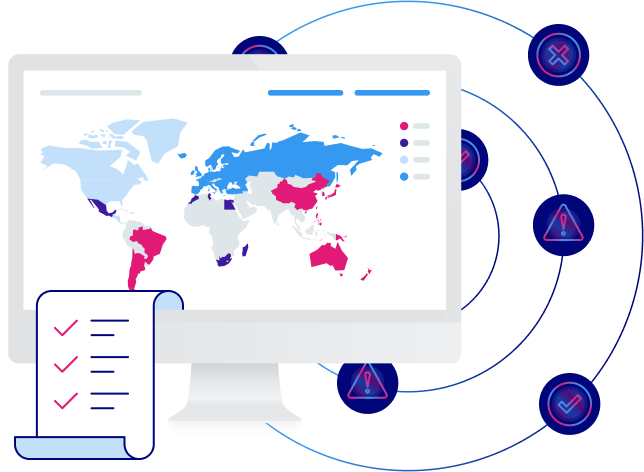-
Solutions
- AI Governance
- Responsible AI
- Geo-Specific Cookie Banner
- Consumer Preference Management
- Data Subject Request Automation
- Data Mapping and Vendor Risk Management
- Migrate
- Privacy, Vendor, and Risk Assessments
- Privacy Program Management
- Regulatory Guidance
- Privacy Program Consulting
- Certifications and Verifications
- International Data Transfers
Forrester TEI ROI of Privacy ReportTrustArc commissioned a Forrester study to analyze the potential benefits of using our platform and the Forrester team found ROI linked to efficiency, compliance, and decreased cost in data breaches.
Read the report -
Products Products Privacy Studio Overview
Automate consent and data subject rights compliance. Design seamless privacy experiences to enhance customer trust across your digital landscape.
- Cookie Consent Manager Effortlessly manage cookie consent for global compliance, ensuring a secure, personalized browsing experience.
- Consent & Preference Manager Easily manage and orchestrate customer consent and preferences across brands and channels.
- Individual Rights Manager Automate and streamline DSR workflows to ensure compliance and show your commitment to customer rights.
- Trust Center Centralize policies, disclosures, and trust-building information in a customizable no-code hub that speeds up deals.
Products Governance Suite OverviewStay ahead of privacy and compliance regulations. Simplify data privacy management and ensure data governance with cutting-edge apps.
- PrivacyCentral Centralize privacy tasks, automate your program, and seamlessly align with laws and regulations.
- Data Mapping & Risk Manager Gain full visibility and control of your data and accurately identify and mitigate risks.
- Assessment Manager Automate and score privacy assessments like PIAs and AI Risk, streamlining your compliance workflow.
- Nymity Research Get instant access to the latest in privacy regulations, legal summaries, and operational templates.
Products Assurance Services OverviewGain trust and credibility with leading privacy certifications from unbiased experts, backed by technology for unmatched privacy compliance assurance.
- Dispute Resolution
- TRUSTe Global CBPR and PRP Certification
- Data Privacy Framework Verification
- TRUSTe APEC CBPR and PRP Certification
- TRUSTe Responsible AI Certification
- TRUSTe Enterprise Privacy Certification
- CCPA/CPRA Validation
- GDPR Validation
- TRUSTe Data Collection Certification
- TRUSTe EDAA Privacy Certification
- Digital Advertising Alliance Validation
-
Regulations
- EU General Data Protection Regulation (GDPR)
- California Consumer Privacy Act (CCPA)
- Virginia Consumer Data Protection Act (CDPA)
- NIST AI Framework
- ISO/IEC 27001
EU Artificial Intelligence Act (EU AI Act)EU's regulation on the use of AI and the world's first comprehensive AI law.
Learn moreIndia Digital Personal Data Protection ActComprehensive data protection law governing the processing of personal data of Indian citizens.
Learn more - Resources
- Arc ✦
- Contact us
Digital Personal Data Protection Act
India’s DPDPA is a comprehensive data protection law that governs the processing of the digital personal data of Indian citizens. The DPDPA is expected to come into effect in 2024.
Does India’s DPDPA Apply to My Organization?
The DPDPA applies to the processing of digital personal data in India in the course of offering goods and services, and outside of India if the processing is connected with an activity relating to offering goods or services to Indian citizens.
Obligations under DPDPA
Appoint a DPO
DPDPA requires organizations classified as significant data fiduciaries (e.g., controllers) to appoint a DPO who is located in India to represent the organization and address inquiries made by individuals about the processing of their personal data. The contact information of the DPO needs to be publicly available.
Conduct data protection impact assessments (DPIA) and compliance audits
Significant data fiduciaries must periodically conduct DPIAs to assess and manage the risk of personal data processing activities. Organizations must appoint an independent auditor to evaluate its compliance with the DPDPA.
Individual rights
Individuals have the following rights under the DPDPA with regard to their personal data: access; correction; and erasure.
Consent & transparency
Individuals must consent to processing in a way that clearly demonstrates their intent, and be able to easily revoke that consent at any time. Inform individuals about the processing of their personal data and how to exercise their rights prior to requesting their consent.
Security and incident response
The DPDPA requires all data fiduciaries to implement appropriate technical and organizational measures to protect personal data under its control, including data processed on its behalf by a data processor, and to notify the Data Protection Board and each affected individual in the event of a breach.
Grievance redressal
There must be an effective mechanism for individuals to raise concerns about the processing of their personal data and exercise their rights, including escalation to the Data Protection Board.

Unpacking India’s DPDP Act: What You Should Know
As India moves toward enforcing the India Digital Personal Data Protection (DPDP) Act in March 2026, organizations operating in India face critical months ahead. This webinar offers an essential briefing to help privacy, compliance, and legal teams understand what must be in place before enforcement begins.
Achieve compliance
-
Compliance management Identify gaps and track compliance with PrivacyCentral – assess regulation specifics and automatically get guidance to build a sustainable privacy program.
-
Mitigate risks Use the pre-built personal information protection impact assessment (PIPIA) template and automatically produce a mitigation plan using TrustArc’s Assessment Manager.
-
Record consent Easily honor customer privacy preferences at every touchpoint with a Consent and Preference Manager across all your applications, domains, mobile apps, and connected TV.

Related resources
View all resourcesThe information provided does not, and is not intended to, constitute legal advice. Instead, all information, content, and materials presented are for general informational purposes only.




